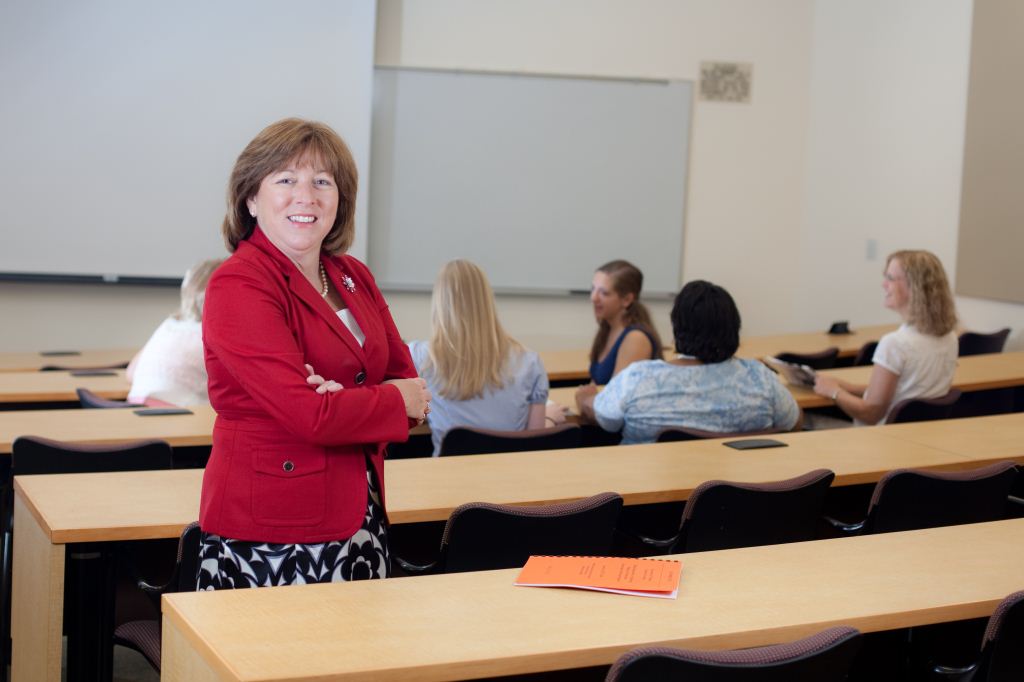When Polly arrived at the front of the class – late, of course, and clad in a stained bathrobe, a newborn clutched in her arms, curlers in her hair and a soiled diaper and pad sticking to her hindquarters – the third-year nursing students first snickered with surprise, then grew quiet.
“My husband doesn’t want to get anywhere near me,” moaned Polly – the alter ego of University of Virginia nursing professor Emily Drake, an NIH-funded researcher who studies postpartum depression and teaches maternal and child health at the School of Nursing – “and my hair’s falling out. I’m so moody, and irritable, I’m thirsty all the time, and I’ve got milk leaking from my breasts all over the place. And I still look pregnant!”
“All this, it’s totally normal,” said Drake’s colleague, nursing professor Mary Gibson, who co-teaches the nursing course. “This is a really hard time, Polly: You need to remember that.”
Gibson offered a straight face to Polly’s unhappy mania for about five minutes before Polly’s departure at the rear of the lecture hall, to the applause and laughter from the roomful of third-year nursing students.
For Drake, a researcher in maternal-child health, postpartum depression is an issue that deserves a spotlight. Given the importance of screening, which is often not routine, Drake is currently piloting the effectiveness of a novel postpartum depression computer test among rural women – an application that may ultimately bolster health care providers’ ability to detect the disease before offering appropriate referrals and treatment for women of all backgrounds.
Drake’s “Postpartum Polly” character makes regular appearances in undergraduate nursing courses, including Drake and Gibson’s “Nursing Care of Women and Childbearing Families” class. Drake said her goal is “to bring the real-life issue into the classroom.”
“Nursing’s not just about learning abstract facts and figures,” said Drake, who won an Excellence in Teaching Award from a national nursing group earlier this year. “We want the students to think about and understand the patient and family’s perspective as they take care of them. I want to build empathy and emotional intelligence in my students. Nursing really is the fusion of the art of compassion and hard science.”
Experts estimate between 10 to 15 percent of women are affected by postpartum depression -- known colloquially as the “baby blues” -- with about 400,000 new cases a year in the U.S. alone. Characterized by a decline in functional status and a depressed mood or decreased interest in pleasure, postpartum depression symptoms typically appear within four weeks of delivery, but may arise between six to 12 months later. Left untreated, it can linger for months or even years and may inhibit young children’s cognitive development. Research has shown that children born to depressed mothers may experience experience language delays and have lower IQs.
The stigma of feeling sad during a time that many believe ought to be uniformly joyful increases the fear of reporting it, explained Drake, who urges nursing students to be respectful and empathetic as they screen for symptoms, offer referrals and treatment. Polly, she said, brings the message home and serves as a fond, funny memory of something dramatically more serious.
“This kind of teaching is what makes our professors so remarkable,” said Dorrie Fontaine, dean of the Nursing School since 2008 and the Sadie Heath Cabaniss Professor of Nursing. “Bringing to life an issue like postpartum depression – where one can learn the details, but not the feel of it – is a critical exercise in understanding a disorder like this. We know Emily’s remarkable teaching leaves a lasting impression on students – and informs the clinicians they’ll become.”
For Drake’s part, it’s also a chance to break away from didactics, adding a little spice to a lecture-based class.
“I want the students to get excited about learning about a topic they might not yet care about,” she said, “and I believe that bringing a little fun into the classroom is a good thing. Learning and laughing are not mutually exclusive concepts.”
Media Contact
Article Information
September 24, 2013
/content/postpartum-polly-offers-nursing-students-memorable-glimpse-baby-blues

